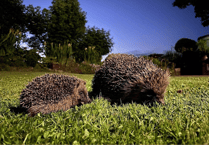The hot weather continues to bake the UK and Ross-on-Wye is one of those places being hit by the current heatwave.
The temperature in Ross at 2pm today, Thursday, July 26th according to the Met Office was 27.2°C which was slightly lower than the recorded temperature of 28.6°C at 1pm today. Temperatures are due to continue to rise throughout the afternoon, with 29°C seeming likely.Friday will be another hot day but with slightly cooler air, however temperatures are still likely to reach 27°C.
Public Health England have issued the following tips to stay safe in a heatwave:
Stay out of the sun between 11am and 3pm when the sun is at its fiercest.
Have cool baths or showers, and splash yourself with cool water.
Drink cold drinks regularly, such as water and diluted fruit juice. Avoid excess alcohol, caffeine (tea, coffee and cola) or drinks high in sugar.
Listen to alerts on the radio, TV and social media about keeping cool.
Plan ahead to make sure you have enough supplies, such as food, water and any medications you need.
Identify the coolest room in the house so you know where to go to keep cool.
Wear loose, cool clothing, and a hat and sunglasses if you go outdoors.
Check up on friends, relatives and neighbours who may be less able to look after themselves.
Animals also suffer in the heat and PDSA vet, Paul Manktelow, has outlined his top tips for keeping animal companions fit and well during summer.
Never leave pets in hot cars, conservatories or caravans. Not even for a couple of minutes. Even on a mild day the temperatures can rise incredibly quickly causing our pets to overheat. Within a very short space of time, they can develop heatstroke, which can be fatal
Provide lots of clean, fresh water. Check your pet’s water bowls or bottles at least twice a day and regularly refill with of cool water.
Exercise your pet at cooler times in the day. Take walks in the mornings or evenings when temperatures are lower, and avoid the midday heat. Be extra vigilant of any flat-faced, overweight pets, or very fluffy dogs who may struggle even more to keep themselves cool.
Ensure your pet has access to shade. Constant access to cool shaded areas is a must for hot days, and it’s also important to keep hutches and cages out of direct sunlight. Move indoor cages away from windows and make sure your other pets can get out of direct sunlight when they need to.
Protect your pet with pet-safe sunscreen. These are available from all good pet stores and can be used on areas of thin fur. It is particularly important in white pets, and on areas such as the nose and ear tips.
Regular trims. Keeping your pet’s fur neat and trimmed may stop them from getting too hot. This is particularly important for dogs with very hairy feet. Dogs lose heat through their foot pads so keep hair in between these pads nice and short.
Take care when travelling. If you’re going on a journey in the car, make sure there is plenty of fresh air and the temperature of the car is cool. Make regular stops and offer your pet water frequently. Never let your dog put their head out of the car window and never leave them in a parked car.
Be careful when enjoying BBQs. It’s not uncommon for dogs to swallow corn cobs and then need them surgically removed from their stomach or gut. Kebab skewers are also particularly dangerous. Clean up and keep dangerous items away from your four-legged friend. Also watch out for alcoholic drinks and glass bottles
Check rabbits for flystrike. This is a serious maggot infestation that can be fatal. During summer months rabbits should be checked underneath (checking their bottoms) at least twice a day for fly eggs and uncleaned poo. Keep their back end clean by wiping gently with a clean damp cloth, removing any faeces and trimming the fur if necessary. Apply a preventive product regularly to stop flies laying eggs. Keep hutches nice and clean too, and if you spot any maggots on your rabbit then take them to the vets immediately; this is an emergency.
With all of these tips in mind, it’s important to watch out for signs of heat stroke. Excessive panting, dribbling, unusual behaviour, disorientation and a bright red tongue or gums can quickly escalate to fatal collapse. If you see any signs of heatstroke, call your vet immediately.





Comments
This article has no comments yet. Be the first to leave a comment.